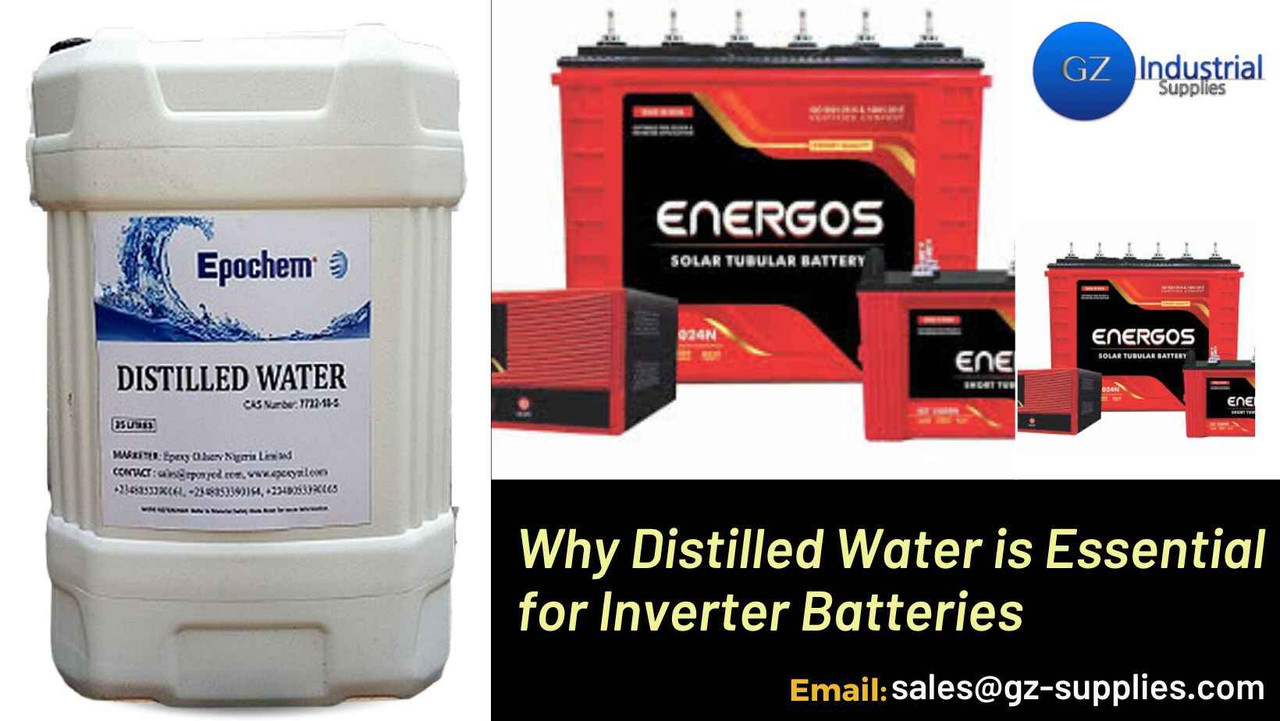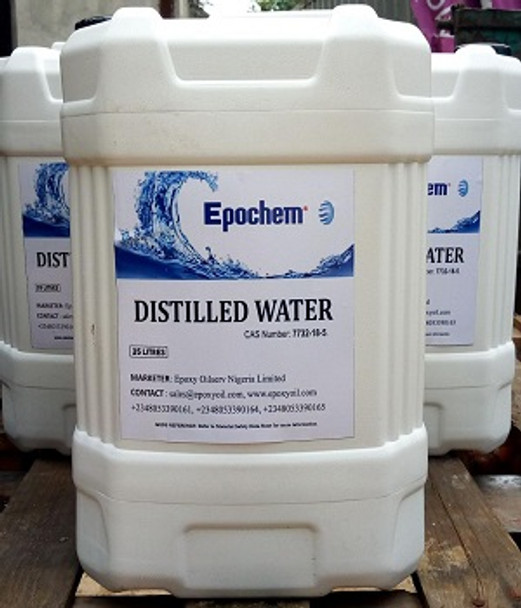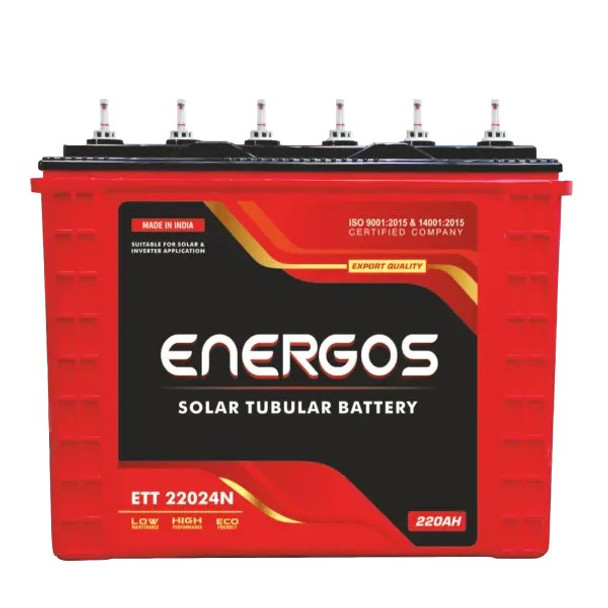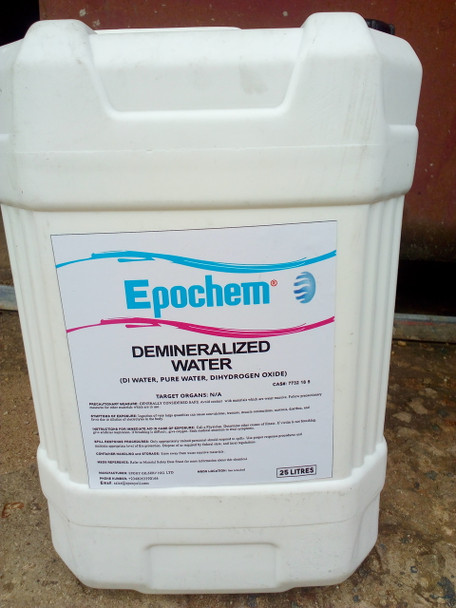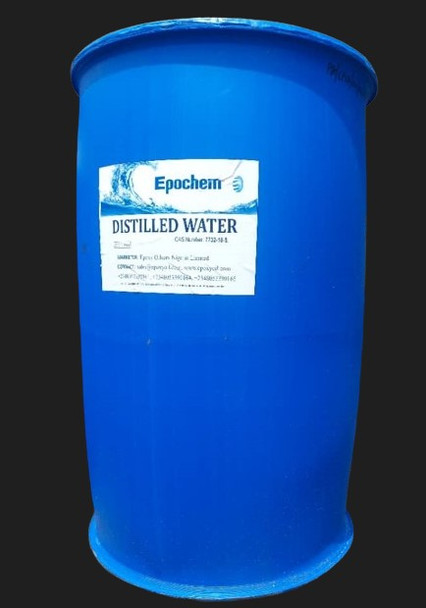Why Distilled Water is Essential for Inverter Batteries
Introduction
Inverter batteries are the backbone of uninterrupted power systems, ensuring a consistent energy supply during outages. However, their efficiency and longevity depend on proper maintenance. One critical yet often overlooked aspect is the use of distilled water in these batteries. This article delves into the chemical reasons why distilled water is essential for inverter batteries, exploring the science behind its impact.
Epochem Distilled Water 20 Liters
Key Takeaway
- Prevents Impurity Build-Up: Distilled water is free from minerals and impurities, which can cause sediment build-up and harm the internal components of inverter batteries.
- Maintains Electrolyte Purity: The use of distilled water helps preserve the chemical purity of the electrolyte, ensuring consistent battery performance and longevity.
- Reduces Corrosion Risks: By eliminating minerals that contribute to corrosion, distilled water helps prevent damage to the battery’s internal plates and components.
Understanding the Role of Water in Inverter Batteries
Inverter batteries, specifically lead-acid batteries, rely on an electrolyte mixture of water and sulfuric acid to store and release energy. During the charging and discharging cycles, electrochemical reactions occur:
1. Charging Phase:
Water molecules break into hydrogen and oxygen gases, which escape from the battery. This results in a gradual reduction of water levels in the electrolyte.
2. Discharging Phase:
The electrolyte facilitates the transfer of ions between the positive and negative plates, enabling the generation of electrical energy.
Maintaining the correct water level in the electrolyte is crucial to ensure uninterrupted ion transfer and efficient operation of the battery.
Energos 12V-220AH Tubular Battery
Chemical Impurities in Regular Water
Using regular water, such as tap or well water, can introduce harmful impurities into the battery. These impurities typically include:
1. Minerals:
Calcium, magnesium, and other hard water components can form insoluble deposits.
2. Salts:
Sodium chloride and similar compounds can alter the electrolyte’s chemical balance.
3. Organic Matter:
Contaminants such as microorganisms and organic residues can interfere with battery performance.
These impurities can lead to undesirable chemical reactions, such as:
1. Corrosion of Lead Plates: Minerals and salts react with the lead plates, accelerating their degradation.
2. Formation of Insoluble Compounds: Deposits reduce the effective surface area of the plates, lowering battery capacity.
3. Impaired Electrolyte Function: Impurities disrupt ion movement, reducing the efficiency of energy storage and transfer.
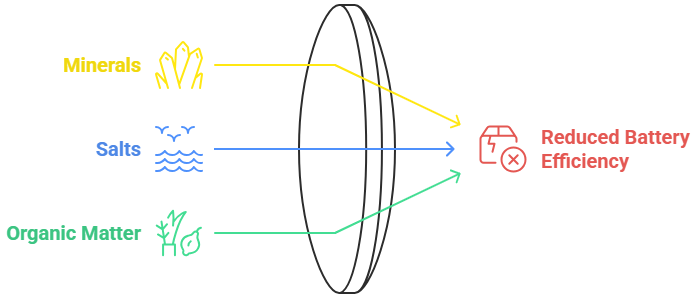
Why Distilled Water is Ideal
Distilled water is water that has undergone a purification process to remove impurities, minerals, and ions. This makes it the perfect choice for inverter batteries for several reasons:
1. Chemical Purity:
Distilled water contains no dissolved salts, minerals, or contaminants.
2. Stable Electrolyte Composition:
The absence of impurities ensures the sulfuric acid concentration remains consistent.
3. Prevention of Adverse Reactions:
Without contaminants, distilled water eliminates the risk of unwanted chemical reactions that can degrade the battery components.
By using distilled water, you help maintain the chemical integrity of the electrolyte, ensuring optimal performance and a longer battery lifespan.
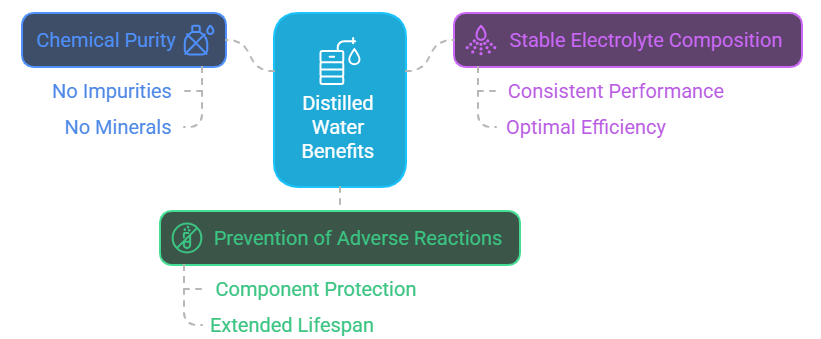
Impacts of Using Non-Distilled Water
The use of non-distilled water in inverter batteries can have significant negative consequences:
1. Accelerated Corrosion:
Impurities react with the lead plates, leading to faster degradation and reduced lifespan.
2. Reduced Battery Capacity:
Deposits from minerals and salts block the active surface area of the plates, lowering the amount of energy the battery can store.
3. Electrolyte Imbalance:
Salts and other contaminants alter the chemical composition of the electrolyte, reducing efficiency.
4. Increased Maintenance Costs:
Impurities lead to frequent breakdowns, necessitating costly repairs or replacements.
Real-world examples highlight how the use of regular water can shorten a battery’s lifespan, emphasizing the importance of using distilled water exclusively.
Demineralised Water 20 Liters
Chemical Benefits of Using Distilled Water
Using distilled water ensures the following key advantages for your inverter battery:
1. Preservation of Lead Plates:
Prevents the formation of corrosive deposits, maintaining the structural integrity of the plates.
2. Enhanced Electrolyte Performance:
Ensures consistent ion transfer, optimizing battery efficiency.
3. Longevity:
Prolongs the life of the battery by minimizing wear and tear caused by impurities.
4. Reduced Risk of Sulfation:
Maintains proper chemical balance, preventing lead sulfate crystallization, a major cause of battery failure.
Frequently Asked Questions
1. Why can’t I use tap water in my inverter battery?
Tap water contains minerals, salts, and impurities that can corrode battery components, reduce efficiency, and shorten the battery’s lifespan.
2. How often should I add distilled water to my inverter battery?
Check the water levels monthly. Add distilled water only when the electrolyte levels fall below the recommended mark.
3. Can I use filtered water instead of distilled water?
No. Filtered water may still contain dissolved minerals and impurities that can harm the battery. Only distilled water ensures the required purity.
4. What happens if I overfill the battery with distilled water?
Overfilling can cause the electrolyte to overflow, leading to spillage and potential damage to the battery and surrounding areas.
5. How can I identify if my battery has been damaged by impure water?
Symptoms include reduced charging efficiency, shorter backup times, and visible corrosion on the terminals or plates.
Epochem Distilled Water 200 Liters
Related Articles
Signs Your Inverter Battery Needs Distilled Water
Top Up Your Inverter Battery with Distilled Water: A Quick Guide
Conclusion
Inverter batteries rely on the purity of their electrolyte to function efficiently and last longer. Distilled water plays a crucial role in maintaining this purity by preventing impurities, sediment build-up, and corrosion. By using distilled water, you can ensure chemical stability, extend the lifespan of your battery, and enhance its overall performance. Investing in the right maintenance practices, like regularly topping up your battery with distilled water, is essential for optimal inverter performance and reliability.
Ensure your inverter battery remains in top condition by using high-quality distilled water. Visit Gz Industrial Supplies to find premium distilled water and other essential battery maintenance products. Keep your power systems running efficiently with the best care practices today!

